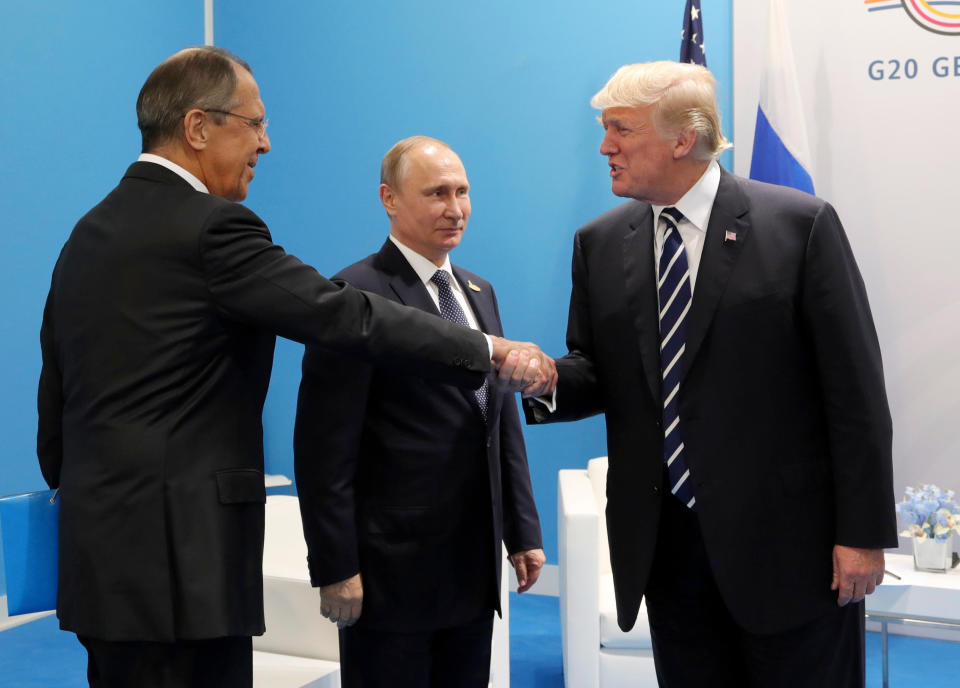Ex-sanctions czar bashes Obama administration's 'weak' response to Russian interference

The former State Department diplomat who oversaw U.S. government sanctions policy said he was “extremely” frustrated when the Obama administration issued “weak” and “frankly inadequate” sanctions against Russia in December 2016 in response to that country’s campaign to disrupt the U.S. presidential election.
Daniel Fried, who retired in 2017 after a 40-year State Department career that included serving as U.S. sanctions “coordinator” under President Obama, offered his sharp critique of the Obama administration’s response to Russian actions during an interview on the Yahoo News podcast “Skullduggery.”
“The Obama administration — in my view, and I was in it, OK? I was working on sanctions then — did not respond with adequate strength to the Russian interference in our elections,” Fried said. ”What we did in December 2016 was a very light set of sanctions, which I think was frankly inadequate. … We went after some cybertargets, we expelled some diplomats, we sanctioned some of the intel services. But those sanctions are not apt to be terribly effective, and we knew it. This was not enough.”
Fried was referring to a series of sanctions Obama announced in late December 2016. Declaring that “all Americans should be alarmed” by Russia’s actions during the election, Obama said at the time that the actions were “a necessary and appropriate response to efforts to harm U.S. interests in violation of established international norms of behavior.”
But Fried said the lack of teeth in the president’s actions may have only emboldened the Russians. “I think it was an inadequate response, and I think the Russians understood it as inadequate,” Fried said. “The Russians are pretty good at calculating costs and benefits.”
Fried said he gives the Obama White House “a lot of credit” for a forceful response to Russia’s “aggression” in Ukraine in 2014 — including authorizing the deployment of NATO troops in the Baltics and Poland. But asked how frustrated he was by the White House election response, Fried replied: “Extremely. I think we missed an opportunity.”
Fried’s comments came during a wide-ranging interview in which he described as “puzzling” the fact that President Trump’s White House undercut U.N. Ambassador Nikki Haley this week by pulling back on plans for additional sanctions against the Russians to punish President Vladimir Putin’s government for its support of the Syrian regime of President Bashar Assad.
In an interview on CBS’s “Face the Nation” last Sunday, Haley declared that the new sanctions would be announced by the next day by Treasury Secretary Steve Mnuchin — an announcement that never came after Trump overruled his advisers and scrapped the additional sanctions. After White House economics adviser Larry Kudlow suggested Haley had misstated U.S. policy because she was confused, Haley issued a stinging rebuke: “With all due respect, I don’t get confused.”
Download or subscribe on iTunes: “Skullduggery” by Yahoo News
Fried said he found Trump’s pullback on sanctions especially “disheartening” because the administration had just a week earlier unveiled stiff actions — including blacklisting Russian oligarchs and senior government officials — in response to what was described as Moscow’s “malign activity” around the globe. At a moment when the Trump administration could make a “reasonable case” that it was starting to develop a serious policy toward Russia, Fried said, the president had once again undercut the effort.

Fried also elaborated on comments he made to Yahoo News last year about his distress when he learned that, shortly after Trump took office, the White House was planning to scrap all sanctions against Russia — including those imposed in 2014 in response to that country’s intervention in Ukraine.
What especially infuriated him, Fried told “Skullduggery,” is that the White House’s plan was to lift the sanctions “in exchange for nothing — sort of as a goodwill gesture to the Russians, which I found somewhere between shocking and astonishing, that somebody would be played for such a sucker.” The proposed action, which Fried believed was being pushed by then National Security Adviser Michael Flynn, would have been “an actual surrender of an important American position and a betrayal of a country, Ukraine, that was under the threat of Russian aggression.”
Fried was a career diplomat who was still serving in the State Department at the time. He didn’t retire until February 2017. But he decided to take his own actions to try to block the Trump administration move by appealing to members of Congress to pass legislation to codify the Ukraine sanctions and call for additional ones — a move that came to fruition later that year. Trump at first considered vetoing the legislation, but reluctantly signed it when it was clear any veto would be overturned by Congress.
More “Skullduggery” from Yahoo News:

 Yahoo News
Yahoo News 


